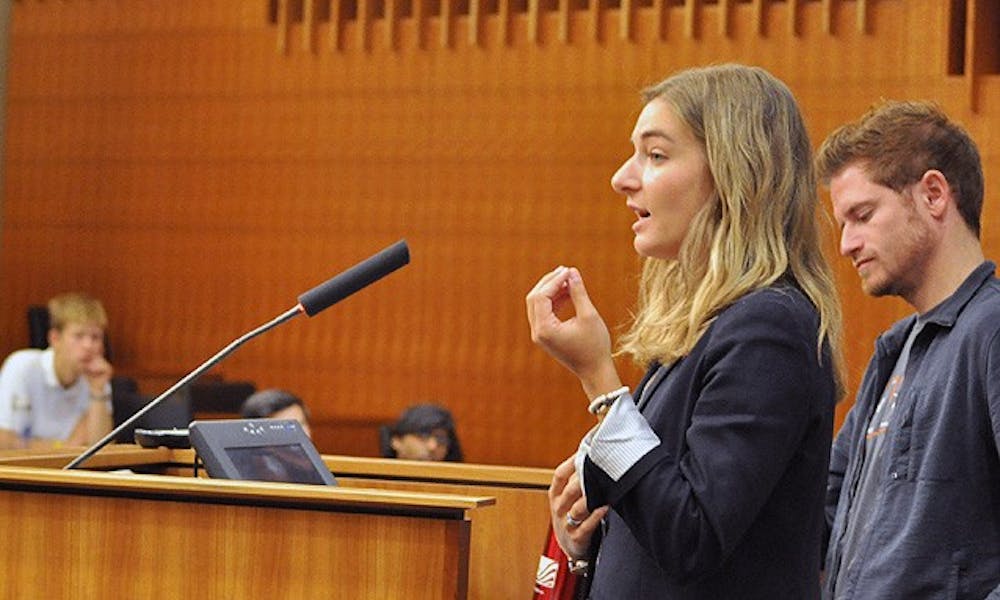Ensuring social justice abroad could be in the hands of undergraduate students.
Duke Partnership for Service’s Eureka Symposium brought together experts from various fields Saturday to discuss how students can push universities to promote and maintain socially responsible practices. Hosted by Duke Global Health Institute, the symposium focused on issues such as socially conscious investments in conflict minerals from the Democratic Republic of the Congo and movements for access to pharmaceuticals manufactured at universities.
“What we really wanted to do with this summit was to bring people together, in a central location, on the subject of innovation [and] social entrepreneurship,” said junior Neha Sabharwal, vice president of events for dPS and chief organizer of the Eureka Symposium.
Consumers send hundreds of millions of dollars to armed groups in the Congo that use rape and violence to destabilize families, communities and societies as a means of controlling mining areas, said J.D. Stier, the Raise Hope for Congo campaign manager. The campaign is part of the Enough Project, a nonprofit dedicated to ending genocide and crimes against humanity. With more than five million people dying in the Congo during the past two decades, Stier noted the importance of educating students on the issue.
Minerals are mined in the Congo and then shipped to smelters in Southeast Asia where they are turned into metals, said Alexandra Hellmuth, Raise Hope for Congo campaign student and youth coordinator for the Enough Project. American electronics companies, in turn, buy metals from these smelters and use them to produce cell phones, among other consumer goods.
Hellmuth said that if the violent practices currently taking place in the Congo are ever going to change, universities must voice protest against financing violence abroad.
“First we must remove the economic incentive for waging war,” Hellmuth said. “Given the status of universities as investors, as thought leaders, as corporate account leaders, an institution’s voice publicly committing to the power of conflict-free products is powerful and influential.”
Stier said it is necessary for the Duke undergraduate population to promote socially conscious consumption of products manufactured abroad.
“What is a vital need is to reach out to other campuses, to reach out to your local state government, to reach out at the federal level,” Stier said. “[It is vital] to build this movement through this entry point of conflict free electronics, to bring a broader peace to the region and to talk about the deeper complexities on the ground.”
The second half of the symposium focused on global health responsibilities, especially with regard to bringing new medical technology to underdeveloped nations.
Robert Johnston, founder and executive director of Global Vaccines and co-founder of the biotechnology company AlphaVax, discussed the importance of promoting affordable biologics—such as vaccines—worldwide. Johnson also outlined a number of policy suggestions, such as opposing data exclusivity for antibiotic innovation and supporting local efforts to encourage socially responsible licensing practices at universities.
Duke still has work to do as a medical research institution particularly in its responsibility to make the latest health technologies available to developing countries, Sandeep Kishore, Trinity ’04, said. In 2009, a coalition of universities led by Harvard University and Yale University created a resolution reaffirming the importance of affordable biologics, such as vaccines and medications.
Although the University signed this agreement, the Duke representative failed to show up to a recent review of the coalition, Kishore said, noting Duke should work to make medical technologies available in developing countries sooner.
Reflecting larger trends of student activism, the Eureka Symposium may be the sign of future efforts to promote social change on campus, said dPS President Sanjay Kishore, a junior.
“Rising up together for social justice is in our blood here at Duke,” he said. “Our whole culture is not defined by scandalous lacrosse parties or PowerPoints. It’s defined by our tradition, our commitment, our precedent for standing up for social change.”
Get The Chronicle straight to your inbox
Signup for our weekly newsletter. Cancel at any time.

